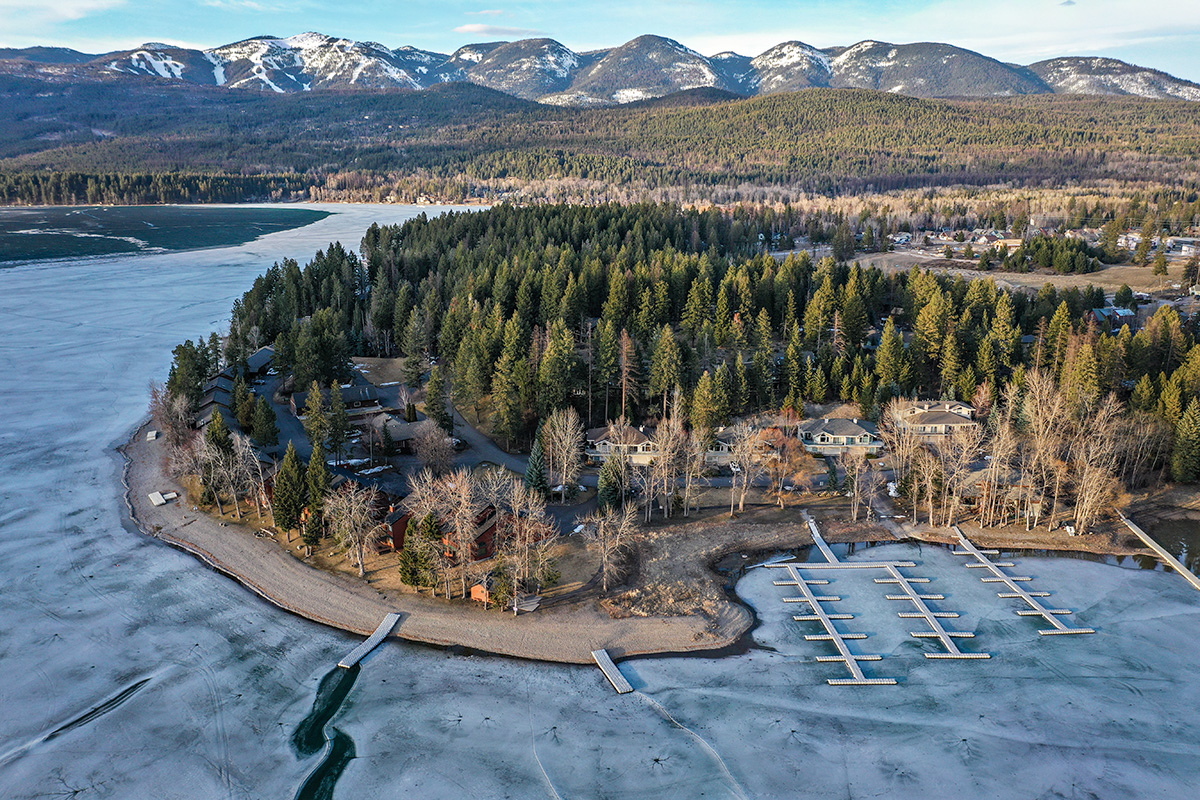Whitefish Council Approves Hiring Short-term Rental Enforcement Officer
In a show of force Monday night, residents bemoaned the city’s depleted housing inventory and urged officials to crack down on hundreds of illegal rentals
By Tristan Scott
With little or no enforcement in Whitefish city limits, the volume of illegal short-term rental listings has ballooned in recent years, eroding the resort community’s stock of long-term housing while pushing its “missing middle” to the margins. That’s according to city officials and 17 full-time residents who on Nov. 20 urged their representatives to crack down on illegal rentals by enforcing the existing rules. The testimony also included heart-wrenching stories about personal experiences with housing insecurity.
“I feel like I’m on the edge right now. Rent went up again and I’m paying 60% of my income to hang onto my apartment,” said Susan Whitworth, who lives on Colorado Avenue. “It’s frightening to think that I could be the next person living on the street or living in my car. I do hope you will enforce the existing rules and educate the public as to what those rules are.”
In a unanimous vote, the council acquiesced, granting the city permission to proceed with hiring a short-term rental code enforcement position and acknowledging that enforcing the existing rules is a necessary step toward solving the city’s housing affordability and scarcity crisis.
“I think what people are saying to you is that this community is really at its breaking point,” said Rhonda Fitzgerald, the owner of the Garden Wall Inn and a member of the Whitefish Strategic Housing Plan Steering Committee. She added that public data this summer revealed there were 705 active short-term rentals available in September in city limits, while only 374 were registered with the city.
“So, that’s a lot of illegal short-term rentals,” Fitzgerald said. “There are a lot of people basically being scofflaws because they know there hasn’t been enforcement. I think just saying that you are going to do it will have an immediate effect.”
According to Whitefish City Manager Dana Smith, hiring a full-time short-term rental code-enforcement officer was approved in the city’s budget for fiscal year 2024, with funding slated to come from a combination of business licensing fees from short-term rentals and property tax revenue. However, city staff has delayed filling the position until after they could determine whether measures enacted by the 2023 Montana Legislature would restrict Whitefish’s ability to regulate short-term rentals.

With the session over, Smith said city staff found that one measure did just that, and has already led to litigation challenging the city’s ability to regulate short-term rentals.
Specifically, Senate Bill 262 restricted local municipalities with self-governing powers, including Whitefish, from requiring short-term rental property owners to obtain a business license. However, Smith says Whitefish identified a way to make the licensing program compliant with the new law. By amending the city’s business-licensing rules to include a business-registration program for short-term rental property owners — an amendment council unanimously approved Monday night and which is slated for final approval next month — the city can remain in compliance with the law while still tracking short-term rentals. The amendment also requires some professional license holders, such as contractors, to carry liability insurance up to $300,000.
“With the proposed change to a business registration program to promote public safety and assist with enforcement of regulations and ordinances, proceeding with hiring the position is now possible,” according to Smith. She added that, on Dec. 4, staff will also recommend the city council keep fees for the business registration program similar to the current business licensing fees “since they are based on the cost of service to provide public safety measures and other program management.”
“Therefore, the funds already identified to cover the position should remain intact and there will be no additional financial support required from other sources such as property taxes in FY24,” Smith said, acknowledging that pending litigation has already challenged the city’s efforts to regulate its short-term rentals and enforce city code.
The lawsuit she’s referring to was filed in March by Curtis McIntyre, who is challenging the city’s refusal to grant him a short-term rental permit for his property on West Lakeshore Drive, which is located in a single-family residential zoning district that does not allow short-term rentals. In the complaint, McIntyre, who is represented by James Ramlow, a city council candidate who ran unsuccessfully in the most recent election cycle, alleges that Whitefish’s attempt to license him “in his capacity as a landlord” runs counter to SB 262. According to the lawsuit, short-term rentals in Whitefish should be governed by the Montana Landlord and Tenant Act.
The case is the second lawsuit Ramlow has filed on behalf of McIntyre challenging the city’s short-term rental regulations. The first lawsuit was dismissed in December 2022 on the basis that McIntyre “lacks standing.”
“Even if the court were to find that [short-term rental regulations] are unenforceable under state law, McIntyre would still be prohibited from operating [a short-term rental] under the underlying zoning ordinance,” Flathead District Judge Amy Eddy wrote in her order.
Brian Schott, chair of the city’s Sustainable Tourism Management Plan Committee, said he views the lawsuit as an attempt to “thwart good regulation that our residents enjoy” and that the Montana Landlord Tenant Act shouldn’t apply.
“Short-term rental owners are not landlords. Nightly vacation renters are not tenants,” Schott said. “The act was created to protect renters who take control of a property to live in. When you rent a nightly unit you are a lessee, not a tenant. If you rent a nightly unit you are an owner, not a landlord.”
Under the current city code, operating a short-term rental outside of an allowed district or without meeting all the required standards constitutes a municipal infraction and is subject to a $300 fine for the first violation and a $500 fine for each subsequent violation. Each day that a violation remains constitutes a separate violation.
The city of Whitefish hasn’t gone completely without enforcement since tightening restrictions on short-term rental properties, Smith explained. For example, staff in the finance department has chipped away at enforcement of resort tax code and short-term rental regulations on a part-time basis whenever they’ve had time. However, a retirement in that department has meant that the city has lacked an enforcement position since July.
“This is all stuff that this code-enforcement officer position could help us do proactively,” Smith said, adding that enforcing resort-tax collections could also fall under the purview of the new code-enforcement officer. “The funding is there if this business registration program goes through, but it’s still going to come down to litigation and legislative changes.”

Whitefish City Councilor Steve Qunell said that while he believes that code enforcement is necessary, it’s also the responsibility of Whitefish residents to report violators.
“Keep in mind that this is a complaint-driven process,” Qunell said. “We will do our part, but the public needs to do their part, too.”
Short-term rentals are defined as properties available for anything less than 30 days and are only permitted in certain areas of town. The standards do not apply to bed and breakfasts, hostels, hotels or motels. Properties eligible for short-term rentals — including those in zones girding the city center, or located near city beach, off Wisconsin Avenue, near the Whitefish Lake Golf Course, and on Big Mountain — are required to obtain a short-term rental permit and business license. In addition to meeting certain building safety standards, a property must conform to the zoning standards.
David Martin, a taxpayer and permanent resident of Texas Avenue, encouraged council to approve hiring the new position in order to protect working-class Whitefish residents.
“I would like to urge you in all of your deliberations to consider the residents first,” Martin said. “Consider the residents ahead of the tourists. Consider the residents ahead of out-of-state second homeowners. Tonight, you have a chance to hire a person to enforce regulations around [short-term rentals] and I hope you take this opportunity to do so.”
Whitefish has had short-term rental zones in place since the early 1980s, long before short-term vacation rentals were commonplace, city officials noted at Monday’s meeting. A recent survey of Whitefish residents by the Sustainable Tourism Management Committee indicated that nearly 70% of residents think that short-term rentals are a negative addition to Whitefish.